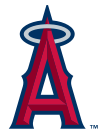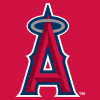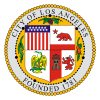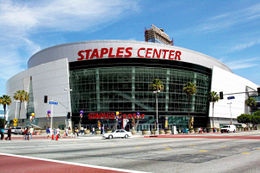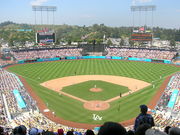Los Angeles Angels of Anaheim
| Los Angeles Angels of Anaheim | |||
|---|---|---|---|
| Established | 1961 | ||
| Based in Anaheim since 1966 | |||
|
|||
| Major league affiliations | |||
|
|||
| Current uniform | |||
|
|||
| Retired numbers | 11, 26, 29, 30, 42, 50 | ||
| Colors | |||
|
|||
| Name | |||
|
|||
|
|||
| Other nicknames | |||
|
|||
| Ballpark | |||
|
|||
| Major league titles | |||
| World Series titles (1) | 2002 | ||
| AL Pennants (1) | 2002 | ||
| West Division titles (8) | 2009 • 2008 • 2007 • 2005 2004 • 1986 • 1982 • 1979 |
||
| Wild card berths (1) | 2002 | ||
| Owner(s): Arte Moreno | |||
| Manager: Mike Scioscia | |||
| General Manager: Tony Reagins | |||
The Los Angeles Angels of Anaheim are a professional baseball team based in Anaheim, California. The Angels are a member of the Western Division of Major League Baseball's American League. The "Angels" name originates from the city that was their original home, Los Angeles. The Angels have been based in Angel Stadium of Anaheim since 1966. In 2009 they were AL Western Division champions for the third straight season.
Contents |
Franchise history

An expansion franchise, the club was founded in Los Angeles in 1961 as the Los Angeles Angels, and played their home games at Los Angeles' Wrigley Field (not to be confused with Chicago's stadium of the same name), which had formerly been the home of the minor-league Los Angeles Angels. The team then moved in 1962 to newly built Dodger Stadium, which the Angels referred to as Chavez Ravine, where they were tenants of the Los Angeles Dodgers through 1965. The team was founded, and owned for its first 36 years, by entertainer Gene Autry. During Autry's ownership, the team was often competitive, making the playoffs three times but never winning the pennant. The Angels were denied a World Series berth in particularly heartbreaking fashion in 1986.
The team has gone through several name changes in their history, first changing their name to the California Angels on September 2, 1965 with a month still left of the season, in recognition of their upcoming move to the newly constructed Anaheim Stadium in Anaheim at the start of the 1966 season.[1] 31 of the team's 50 seasons have been under the California Angels name. When The Walt Disney Company took control of the team in 1997, it extensively renovated Anaheim Stadium, which was then re-named Edison International Field of Anaheim. The City of Anaheim contributed $30 million to the $118 million renovation with a renegotiated lease providing that the names of both the stadium and team contain the word "Anaheim".[2] The team was renamed the Anaheim Angels and became a subsidiary of Disney Sports, Inc. (later renamed Anaheim Sports, Inc.). Under Disney's ownership and the leadership of manager Mike Scioscia, the Angels finally won their first pennant and World Championship (their only one of each, to date) in 2002.
In 2005, new owner Arte Moreno added "Los Angeles" to the team's name in order to better tap into the Los Angeles media market, the second largest in the country. In compliance with the terms of its lease with the city of Anaheim, which required "Anaheim" be a part of the team's name, the team was renamed the Los Angeles Angels of Anaheim. Hotly disputed when initially announced, the change was eventually upheld in court and the city finally dropped its four-year legal battle in 2009. The team usually refers to itself as the Angels or Angels Baseball in its home media market, and the words "Los Angeles" and "LAA" do not appear in the stadium, on the Angels' uniforms, or on official term merchandise. Local media in Southern California tend to omit a geographic identifier and refer to the team as the Angels or as the Halos. The Associated Press, the most prominent news service in the U.S., refers to the team as the Los Angeles Angels, the Angels, or Los Angeles.[3]
The Angels have made the playoffs 4 of the 5 years of Moreno's ownership, but have never returned to the World Series during that time.
Game Traditions
Each game begins with the song Calling All Angels by Train being played on the P.A. If the Angels are losing or the game is tied during the 7th inning the Rally Monkey makes an appearance on the scoreboard, appearing in various movies that have been edited to include him.
Logos and colors

The Los Angeles Angels of Anaheim have used ten different logos and three different color combinations throughout their history. Their first two logos depict a baseball with wings and a halo over a baseball diamond with the letters "L" and "A" over it in different styles. The original team colors were the predominately blue with a red trim. This color scheme would be in effect for most of the franchise's history lasting from 1961-1996.
In 1966, after the club's move to Anaheim, the team name changed from the "Los Angeles Angels" to the "California Angels," along with the name change, the logo changed as well. During the 31 years of being known as the "California Angels," the team kept the previous color scheme, however, their logo did change six times during this period. The first logo under this name was very similar to the previous "LA" logo, the only difference was instead of an interlocking "LA," there was an interlocking "CA." Directly after this from 1971–1985, the Angels adopted a logo that had the word "Angels" written on an outline of the State of California. Between the years 1971-1972 the "A" was lower-case while from 1973-1985 it was upper-case.
It was in 1965, while the stadium was being finished, that Bud Furillo, of the Herald Examiner, coined its nickname, "the Big A." After the tall letter A that used to rim the stadium, now in the parking lot.
In 1986, the Angels adopted the "big A" on top of a baseball as their new logo, with the shadow of California in the background. After the "big A" was done in 1992, the Angels returned to their roots and re-adopted the interlocking "CA" logo with some differences. The Angels used this logo from 1993–1996, during that time, the "CA" was either on top of a blue circle or with nothing else.
After the renovations of then-Anaheim Stadium and the takeover by the Walt Disney Company, the Angels changed their name to the "Anaheim Angels" along with changing the logo and color scheme. The first logo under Disney removed the halo and had a rather cartoon-like "ANGELS" script with a wing on the "A" over a periwinkle plate and crossed bats. With this change, the Angels's color scheme changed to dark blue and periwinkle. After a run with the "winged" logo from 1997–2001, Disney changed the Angels's logo back to a "Big A" with a silver logo over a dark blue baseball diamond. WIth this logo change, the colors changed to the team's current color scheme: predominately red with some dark blue and white.
When the team's name changed from the "Anaheim Angels" to the "Los Angeles Angels of Anaheim," the logo changed only slightly, the name "ANAHEIM ANGELS" and the blue baseball diamond were removed leaving only the "big A."
Radio and television
As of 2009[update], the Angels' flagship radio station is KLAA 830AM, which is owned by the Angels themselves. It replaces KSPN (710 ESPN), on which frequency had aired most Angels games since the team's inception in 1961. That station, then KMPC, aired games from 1961 to 1996. In 1997 & 1998, the flagship station became KRLA (1110AM). In 1999, it was replaced by KLAC for four seasons, including the 2002 World Series season.
The Angels 2010 broadcast line-up was thrown into doubt with the death of Rory Markas in January 2010. The Angels had announced in November 2009 that Markas and Mark Gubicza would broadcast Angels' televised games, with Terry Smith and Jose Mota handling the radio side.[4] At the same time, the Angels announced that Steve Physioc and Rex Hudler would not return to the broadcasting team. On March 3, 2010 it was announced that Victor Rojas will replace Markas.[5]
In 2008, KLAA broadcast spring training games on tape delay from the beginning on February 28 to March 9 because of advertiser commitments to some daytime talk shows. Those games were available live only online. Live preseason broadcasts were to begin on March 10.[6]
In 2009, KFWB 980AM started broadcasting 110 weekday games, including postseason games, to better reach listeners in Los Angeles County and other areas to the north.[7]. All 162 games plus post season games still air on KLAA.
In 2010, KSPN 710AM will broadcast at least 60 weekday games. This will be a partial return to their old station from 2007.[8].
Angels radio broadcasts are also in Spanish on KWKW 1330AM and KWKU 1220AM.
Television rights are held by FSN West and MyNetworkTV affiliate KCOP, with various announcers. During the 2009 season, Physioc and Hudler called about 100 games, while Markas and Gubicza had the remaining game telecasts (about 50, depending on ESPN and Fox exclusive national schedules). The split arrangement dated back to the 2007 season, when Mota and Gubicza were the second team. Markas debuted on TV in a three-game series at the Toronto Blue Jays in August 2007.
Mota, who is bilingual and the son of former Dodger Manny Mota, has also called Angels games in Spanish, and at one time did analysis from the dugout rather than the usual booth position.
All games are produced by FSN regardless of the outlet actually showing the games.
Dick Enberg, who broadcast Angels baseball in the 1970s, is the broadcaster most identified with the Angels, using such phrases as "Oh, my!", "Touch 'em all!" after Angel home runs, and "The halo shines tonight!".
Other former Angels broadcasters over the past three decades include Dave Niehaus, Don Drysdale, Bob Starr, Joe Torre, Paul Olden, Al Wisk, Al Conin, Mario Impemba, Sparky Anderson, Jerry Reuss, Ken Wilson, Ken Brett, and Ron Fairly. Jerry Coleman also spent time with the Angels organization in the early-1970s as a pre-game and post-game host before joining the San Diego Padres broadcast team.
Film
Parent company Disney remade the 1951 film Angels in the Outfield with the California Angels as the team that receives heavenly assistance in the 1994 remake.
Season records
Retired numbers
 Jim Fregosi SS: 1961-71 Manager: 1978-81 Retired August 1, 1998 |
 Gene Autry Team Founder Retired October 3, 1982 |
 Rod Carew 1B: 1979-85 Coach: 1992-99 Retired August 6, 1991 |
 Nolan Ryan P: 1972-79 Retired June 16, 1992 |
 Jackie Robinson Retired by Baseball Retired April 15, 1997 |
 Jimmie Reese Coach: 1972-94 Retired August 2, 1995 |
- #26 was retired for Gene Autry to indicate he was the team's "26th Man" (25 is the player limit for any MLB team's active roster)
- #42 was retired throughout Major League Baseball in 1997 to honor Jackie Robinson
Angels Hall of Fame
The Angels have a team Hall of Fame,[9] with the following members:
| Player | Bobby Grich | Jim Fregosi | Don Baylor | Rod Carew | Nolan Ryan | Jimmie Reese | Brian Downing | Chuck Finley |
|---|---|---|---|---|---|---|---|---|
| Year Inducted | 1988 | 1989 | 1990 | 1991 | 1992 | 1995 | 2009 | 2009 |
Baseball Hall of Famers
As of the 2009 Hall of Fame election, no inducted members have elected to be depicted wearing an Angels cap on their plaque. However, several Hall of Famers have spent part of their careers with the Angels:[10]
| Los Angeles Angels of Anaheim Hall of Famers | ||||||||||||||||||||||||||||||||||||
|---|---|---|---|---|---|---|---|---|---|---|---|---|---|---|---|---|---|---|---|---|---|---|---|---|---|---|---|---|---|---|---|---|---|---|---|---|
| Affiliation according to the National Baseball Hall of Fame and Museum | ||||||||||||||||||||||||||||||||||||
|
Ford C. Frick Award recipients
| Los Angeles Angels of Anaheim Ford C. Frick Award recipients | |||||||||
|---|---|---|---|---|---|---|---|---|---|
| Affiliation according to the National Baseball Hall of Fame and Museum | |||||||||
|
Current roster
| Active roster | Inactive roster | Coaches/Other | |||||||
|
Pitchers
|
Catchers
Infielders
Outfielders
Designated hitters
|
Manager
Coaches
60-day disabled list
† 15-day disabled list |
|||||||
Minor league affiliations
| Level | Team | League | Location |
|---|---|---|---|
| AAA | Salt Lake Bees | Pacific Coast League | Salt Lake City, UT |
| AA | Arkansas Travelers | Texas League | Little Rock, AR |
| Advanced A | Rancho Cucamonga Quakes | California League | Rancho Cucamonga, CA |
| A | Cedar Rapids Kernels | Midwest League | Cedar Rapids, IA |
| Rookie | Tempe Angels | Arizona League | Tempe, AZ |
| Orem Owlz | Pioneer League | Orem, UT |
See also
- All-Time roster
- Angels award winners and league leaders
- Angels statistical records and milestone achievements
- Angels managers and ownership
- Angel Stadium of Anaheim
Notes
- ↑ The Sporting News, The Complete Baseball Record Book (St. Louis: The Sporting News, 1994), 223. Also see the American League standings printed in the New York Times on September 4, 1965.
- ↑ Martin Kasindorf, "Angels' name prompts devil of a lawsuit," USA Today, January 30, 2006 http://www.usatoday.com/sports/baseball/al/angels/2006-01-30-angels-court_x.htm
- ↑ Janie McCauley, "Surging Angels beat A's 4-2 for sixth straight win," Associated Press, June 7, 2010 http://www.google.com/hostednews/ap/article/ALeqM5hcnwfZW5a4ooDsRDA-bHheM6_iUAD9G6SOVO0
- ↑ Diane Pucin, "Rex Hudler, Steve Physioc no longer Angels broadcasters," Los Angeles Times, November 24, 2009 http://latimesblogs.latimes.com/sports_blog/2009/11/rex-hudler-steve-physioc-no-longer-angels-broadcasters.html
- ↑ Pucin, Diane (March 3, 2010). "Victor Rojas named as new Angels play-by-play broadcaster". Los Angeles Times. http://latimesblogs.latimes.com/sports_blog/2010/03/victor-rojas-new-angels-playbyplay-broadcaster.html. Retrieved March 3, 2010.
- ↑ From the dugout » Blog Archive » Angels’ spring radio - OCRegister.com
- ↑ CBS Radio's KFWB News 980 enhances local programming lineup with addition of Los Angeles Angels broadcasts: mlb.com
- ↑ [1]
- ↑ "Angels Hall of Famers". Angels Baseball official website. http://losangeles.angels.mlb.com/ana/history/angels_hall_of_famers.jsp. Retrieved 2009-06-17.
- ↑ National Baseball Hall of Fame and Museum: Home
- Bisheff, Steve. Tales from the Angels Dugout: The Championship Season and Other Great Angels Stories. Sports Publishing L.L.C., 2003. ISBN 1-58261-685-X.
- 2005 Angels Information Guide.
External links
- Los Angeles Angels of Anaheim official website
- Los Angeles Angels of Anaheim Baseball-Reference.com
- Angels Strike Force
| Preceded by Arizona Diamondbacks 2001 |
World Series Champions Anaheim Angels 2002 |
Succeeded by Florida Marlins 2003 |
| Preceded by New York Yankees 1998-2001 |
American League Champions Anaheim Angels 2002 |
Succeeded by New York Yankees 2003 |
|
||||||||||||||||||||||||||||||||||||||||||||||||||||||||||
| Los Angeles Angels of Anaheim franchise | |||
|---|---|---|---|
| Triple-A | Double-A | Class A | Rookie |
| Salt Lake Bees | Arkansas Travelers |
Inland Empire 66ers of San Bernardino Cedar Rapids Kernels |
Orem Owlz AZL Angels DSL Angels |
| AL | East | Central | West |
|---|---|---|---|
| Baltimore Orioles | Chicago White Sox | Los Angeles Angels of Anaheim | |
| Boston Red Sox | Cleveland Indians | Oakland Athletics | |
| New York Yankees | Detroit Tigers | Seattle Mariners | |
| Tampa Bay Rays | Kansas City Royals | Texas Rangers | |
| Toronto Blue Jays | Minnesota Twins | ||
| NL | East | Central | West |
| Atlanta Braves | Chicago Cubs | Arizona Diamondbacks | |
| Florida Marlins | Cincinnati Reds | Colorado Rockies | |
| New York Mets | Houston Astros | Los Angeles Dodgers | |
| Philadelphia Phillies | Milwaukee Brewers | San Diego Padres | |
| Washington Nationals | Pittsburgh Pirates | San Francisco Giants | |
| St. Louis Cardinals | |||
| Postseason: World Series · ALCS · NLCS · ALDS · NLDS | |||
| All-Star Game · World Baseball Classic · MLB awards · Hall of Fame · MLBPA · TV contracts · Timeline of Major League Baseball · MLB logo · Baseball year-by-year · Minor leagues · Federal League · History of baseball · Relocation of the 1950's-1960's · Tie-breakers | |||
|
||||||||||||||||||||||||||||
|
||||||||
